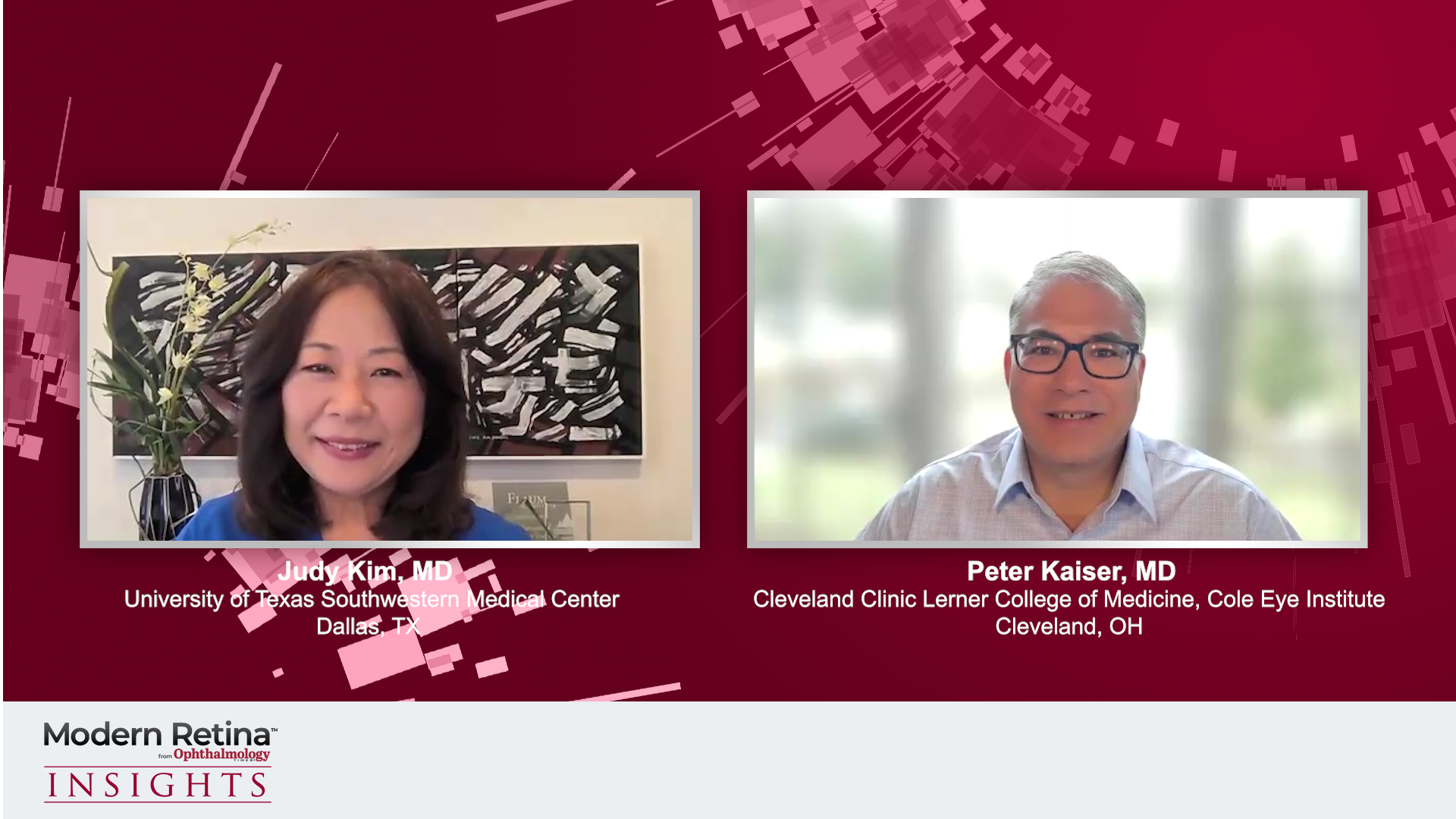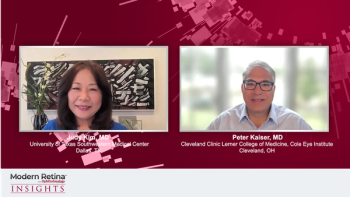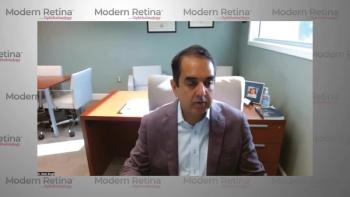
AMD
Latest News

Latest Videos

CME Content
More News

Peter Kaiser, MD discusses the utilization of newer agents, faricimab and high dose aflibercept, for refractory patients who haven't responded well to previous treatments and for patients doing well but aiming to extend dosing intervals.

Experts discuss the use of steroids, particularly in the context of diabetic macular edema (DME). The inflammatory nature of DME reveals the effectiveness of steroids, especially in cases where persistent fluid remains despite anti-VEGF treatment.

The European Commission is expected to make a decision about the application before the end of June.

The prevalence of AMD features in Republic of Korea Air Force pilots was higher than in other general populations studied.

David Eichenbaum, MD, FASRS concludes this series with the final case of a treatment-experienced patient switching from aflibercept 2 mg to high-dose aflibercept 8 mg with noticeable improvement after the first dose.

David Eichenbaum, MD, FASRS provides his clinical experience with faricimab and aflibercept 8 mg, highlighting the small and large changes that benefit a patient’s quality of life, such as improved visual anatomy or reducing the frequency of visits.

Experts discuss the approach to loading doses in the context nAMD and DME. Kaiser, MD explains that loading doses may not be necessary based on studies like the CAT study, while he highlights the importance of individualized treatment plans tailored to the specific needs of each patient and the nuances of different retinal diseases.

David Eichenbaum, MD, FASRS discusses his clinical experience in managing retinal fluid, emphasizing the need to dramatically reduce intraretinal fluid, highlighting different strategies of care that offer the best results for patients.

Judy Kim, MD and Peter Kaiser, MD discuss the significance of fluid dynamics in nAMD and DME, highlighting the detrimental effects of fluid fluctuations and emphasize the importance of minimizing these fluctuations to achieve better visual outcomes.

David Eichenbaum, MD, FASRS discusses a case of exudative macular degeneration and opted for aflibercept 8 mg as treatment, which led to significant improvements in visual acuity and anatomical features.

After 3 loading doses, the patients were randomly assigned to receive EYP-1901 or continue to receive aflibercept at an 8-week dosing pattern for 32 weeks.

An investigation is set to launch on SpaceX’s 30th Commercial Resupply Services mission to the International Space Station contracted by NASA to test the therapy in space.

Judy Kim, MD and Peter Kaiser, MD reflect on the varying criteria for shortening or extending treatment intervals in clinical trials, emphasizing the need for standardization in large-scale studies. They highlight the importance of adapting trial criteria to clinical practice.

Experts discuss the efficacy and durability of newer therapies, focusing on faricimab and the high dose of aflibercept, highlighting the promising clinical trial results, maintaining comparable visual acuity efficacy while achieving longer durability

When we discuss trial participation with patients, we stress that the goal of these studies is to obtain better visual outcomes and ease the treatment burden.

Research indicates smoking increases risk of AMD, cataracts and glaucoma

Judy Kim, MD and Peter Kaiser, MD discuss the use of biosimilars and the potential introduction of biosimilar aflibercept for treating retinal diseases. Experts discuss their preferences for specific drugs and highlight the evolving landscape, anticipating challenges in drug selection and emphasizing the need for collaboration between retinal specialists and insurance companies to optimize patient care.

In this insightful discussion on changing therapeutic approaches in neovascular age-related macular degeneration (nAMD) and diabetic macular edema (DME), Judy Kim, MD and Peter Kaiser, MD address barriers like step therapy and the impact of insurance-guided choices on treatment outcomes. The conversation emphasizes the need for a personalized approach, citing clinical trial data while acknowledging the challenges of aligning real-world practices with stringent trial protocols.

Investigators believe that AMD and cancer may have similar risk factors in common.

Researchers have found that the interactive release of anti-inflammatory drugs depend on the level of retinal degeneration. A customized treatment approach is expected to be developed to reduce patients’ inconvenience of having multiple shots.

Rajendra Apte, MD, PhD, has received the Research to Prevent Blindness /American Macular Degeneration Foundation Catalyst Award for innovative research approaches in studying age-related macular degeneration.

These 3 participants have received their first aflibercept injection for the treatment of wet AMD.

The study further defined the relationship between delayed rod-mediated dark adaptation and the status of outer retinal bands on optical coherence tomography.

Preliminary safety data support a favorable benefit-risk profile at both dose levels. The preliminary efficacy and safety data trending similar to or better than the OPTIC study, in which patients continue to see ongoing clinical benefit through at least 3 years.

According to the company, 4D-150 was well tolerated with a favorable safety profile when evaluated through up to 48 weeks of follow-up, with no significant inflammation observed.






























